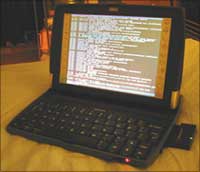 | « Back to article | Print this article |
Growing use of netbooks and laptops has led to a sharp drop in broadband prices. In 2009, about 73,000 netbooks (stripped-down laptops) were shipped to India. First-time users like Rohan Bhandari, a 22-year-old college student, are beginning to see why netbooks and high-speed data cards are a good bet.
 "I was not sure which internet connection to buy - a wireless or a wired broadband connection. But, since I plan to use the laptop at both home and college, a mobile data card makes more sense. Further, recent drop in prices by telecom players has made wireless internet more accessible," says Bhandari.
"I was not sure which internet connection to buy - a wireless or a wired broadband connection. But, since I plan to use the laptop at both home and college, a mobile data card makes more sense. Further, recent drop in prices by telecom players has made wireless internet more accessible," says Bhandari.
The latest price cut has been effected by Tata Teleservices, which has dropped the price of Tata Photon Plus by Rs 1,200 to Rs 2,299 per unit in Maharashtra and Goa. The price is for both pre- and post-paid connections.
Other telecom players, such as Vodafone, Reliance Communications, Virgin Mobile and MTS, have slashed entry-level prices for wireless internet connections. While some have reduced the price of the hardware (USB drive), others are shifting customers to a higher data plan, free of cost.
According to the Manufacturers Association for Information Technology, netbook sales are expected to grow at a compounded annual growth rate of 73 per cent. Laptop sales grew 52.8 per cent to 690,000 units in the fourth quarter of 2009 (October-December).
| New and reduced | |||
| Company | Hardware price (Rs) | Basic tariff/ month (Rs) | |
| Earlier | Now | ||
| Tata Photon | 3,499 | 2,299 | 250 (pay as you go) |
| BSNL | 3,800 | 2,500 |
199 (free 0.5GB) |
| Airtel | 3,799 | no change | 350 (free 500MB) |
| MTS | 3,000 | 1,999 | 198 (free 250MB) |
| Virgin Mobile | 3,499 | 2,399 | 500 (free 0.5GB) |
| Vodafone | 3,099 | 2,999 | 499 (free 500MB) |
| Reliance | 3,500 | 2,900 | 299 (pay as you go) |
| Source: Company websites | |||
In the same period, desktop PCs recorded sales of 1.29 million units, representing year-on-year growth of just 14.6 per cent. Telecom experts, however, said the price cut could be to attract more consumers, considering the popularity of IPL matches on the Internet.
Companies, however, insist that the price decline is natural. "Consumer insight indicates that youths want products that have speed and mobility at a price point within their budget. The revision in price was in keeping with this insight. The aim was also to expand the category," said Shashank Pore, assistant vice-president (marketing), Tata Teleservices.
Experts said there won't be a price war as in the voice category. "Mobile broadband still has a small user base and no one would want to get into a price war yet. Also, this is probably the only segment where telecom players get an average revenue per share of Rs 600-700. This is very less than voice ARPU," says an analyst.
According to a study by ABI Research, the increase in data transfer speeds achieved by wireless PC card modems is expected to increase sales of these devices over the next five years.
Even BSNL has slashed the price of its 3G data card in a bid to rope in more customers. Though it's a promotional scheme, it shows how telecom service providers are attracting customers.
Reliance Communications has also dropped the price of its mobile broadband device by nearly Rs 1,200. "We believe that a price drop from Rs 3,500 to Rs 2,299 will translate into volume growth. We announced this across the 62 cities where we are present and plan to implement it in 132 cities," says Vrajesh Shelat, head (wireless data business), Reliance Communications.
Alok Shende, founder of IT and telecom consulting firm Ascentius Consulting, says: "Typically, in the technology market, products start with a higher price and target high-end customers, whom we call innovators. They create innate demand and, after that, companies target the other segments by reducing prices."
With inputs from Katya Naidu